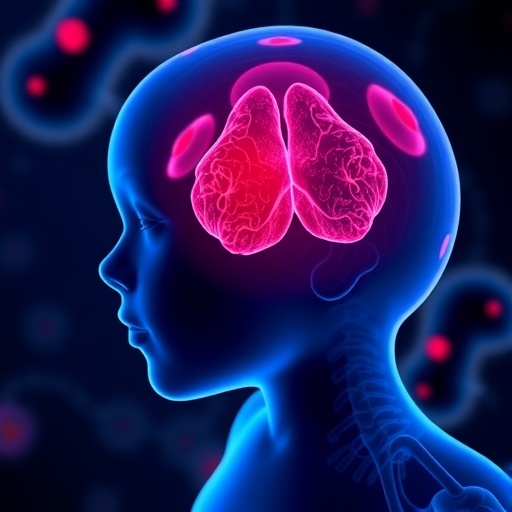The Gabriella Miller Kids First Data Resource Center (Kids First DRC), a pioneering initiative under the National Institutes of Health (NIH), has unveiled its 37th pediatric research study, expanding the scope of genetic insights into rare childhood cancers. This latest addition, the Kids First: Extracranial Germ Cell Tumors study (KF-ECGT), marks a significant advancement in pediatric oncology by offering researchers unprecedented access to a comprehensive dataset focused on extracranial germ cell tumors. These tumors represent a rare and distinct class of cancers developing outside the brain, contrasting with prior intracranial germ cell tumor datasets, and thus providing a holistic perspective on germ cell tumor pathogenesis in both central and peripheral locations.
The dataset comprises genetic, genomic, and transcriptomic profiles derived from 393 pediatric and young adult patients, including 493 biological samples meticulously collected and analyzed under the leadership of Dr. Jen Poynter from the University of Minnesota. The availability of such a robust collection empowers researchers to delve deep into both inherited germline variants and somatic mutations specific to tumor tissues. This dual-level genetic information lays the groundwork for understanding tumor genesis from genetic predispositions to acquired alterations that drive malignancy progression.
Crucially, the study incorporates comprehensive germline genetic data not only from the patients but also, where applicable, from their parents. This trio-based sequencing strategy enhances the interpretative power of the dataset, allowing for the differentiation between inherited pathogenic variants and de novo mutations. This is especially vital in pediatric cancers, which often arise from complex interactions between hereditary risk factors and post-zygotic genetic events. Through the analysis of germline genomes, investigators can identify novel cancer susceptibility genes and unravel hereditary patterns that predispose children to germ cell tumors.
In parallel, the inclusion of somatic genetic profiles generated directly from tumor tissues allows exploration into the mutational landscape shaping tumor biology. Characterizing these somatic alterations reveals oncogenic drivers, tumor suppressor losses, and potential therapeutic targets unique to extracranial germ cell tumors. Such insights are indispensable for the development of precision medicine approaches, as they illuminate pathways that may be exploited pharmacologically to curb tumor growth or induce apoptosis in malignant cells.
Furthermore, the data release encompasses RNA sequencing (RNA-seq) datasets, capturing transcriptomic profiles that exhibit gene expression dynamics within tumor cells. RNA-seq offers a functional layer of information, depicting which genes are actively transcribed and potentially driving the oncogenic phenotype at the molecular level. This permits integrative analyses that correlate genomic aberrations with gene expression changes, thus painting a comprehensive picture of tumor biology from genotype to phenotype.
The KF-ECGT dataset complements an existing Kids First dataset focusing on intracranial germ cell tumors. By bridging data from tumors both inside and outside the brain, researchers gain a panoramic understanding of germ cell tumor ontogeny, allowing comparative analyses of tumor microenvironments, mutational spectra, and gene expression profiles across distinct anatomical sites. Such comparative oncology studies are essential to decipher whether common mechanisms or unique pathways govern tumorigenesis in different tissues, influencing prognosis and therapeutic responses.
Access to these cutting-edge data resources is facilitated through the Kids First Data Resource Portal, a cloud-based platform designed to foster collaboration among a global community of geneticists, oncologists, computational biologists, and clinicians. The portal ensures secure, controlled access to sensitive pediatric data via dbGaP under accession number phs002322, thus balancing data availability with privacy protections. This democratization of data accelerates scientific discovery by enabling diverse analyses, integrating multi-omic datasets, and catalyzing novel hypotheses testing.
The significance of the Kids First program extends beyond data provision. By uniting a multidisciplinary network of researchers and families impacted by childhood cancers, the initiative propels a collective effort towards elucidating disease mechanisms, identifying early biomarkers, and expediting the translation of genomic findings into clinical interventions. The KF-ECGT dataset represents an invaluable tool for this mission, empowering scientists to decode the intricate genetic architecture underlying pediatric germ cell tumors.
In the era of precision oncology, understanding the interplay between inherited genetic factors and somatic mutations is paramount. The KF-ECGT study enables such integrative analyses, promising to unveil biomarkers predictive of disease risk, progression, and treatment responsiveness. Moreover, the dataset fosters opportunities to discover novel therapeutic targets and refine existing treatment regimens by accounting for genetic heterogeneity among pediatric patient populations.
As the landscape of pediatric cancer research rapidly evolves, large-scale datasets like KF-ECGT lend themselves to advanced computational methodologies including machine learning and integrative genomics. By applying these cutting-edge techniques to rich multi-omic data, researchers can stratify patients more accurately, predict treatment outcomes, and potentially unlock mechanisms of resistance that limit current therapies.
Ultimately, the Gabriella Miller Kids First Data Resource Center exemplifies the power of open science and collaborative data-sharing in accelerating pediatric cancer research. With each successive dataset release, including this latest KF-ECGT study, researchers worldwide are equipped with the knowledge and tools necessary to confront the complexities of childhood cancers and improve survival rates and quality of life for affected children and their families.
For those interested in utilizing this dataset or learning more about the KF-ECGT study, comprehensive instructions for requesting controlled access are provided through the Kids First Help Center. This ensures responsible stewardship of sensitive genetic data while maximizing its utility for scientific advancement.
In conclusion, the release of the Kids First: Extracranial Germ Cell Tumors dataset represents a monumental leap forward in pediatric cancer genomics. It embodies a synergistic integration of germline and somatic mutation data with transcriptomic profiling, all made accessible through a centralized, cloud-based platform designed to cultivate global collaboration. The insights gleaned from this dataset have the potential to illuminate the pathogenesis of extracranial germ cell tumors, inform personalized treatments, and ultimately transform clinical care for young patients battling these rare and devastating malignancies.
Subject of Research:
Not applicable
Article Title:
Not provided
News Publication Date:
Not provided
Web References:
https://kidsfirstdrc.org
https://dbgap.ncbi.nlm.nih.gov/beta/study/phs002322.v2.p1/#study
References:
Not provided
Image Credits:
Not provided
Keywords:
Pediatrics, Computational biology, Cancer research, Congenital disorders, Birth defects, Research on children, Clinical research, Genomics, Genomic DNA, Bioinformatics, Sequence analysis




